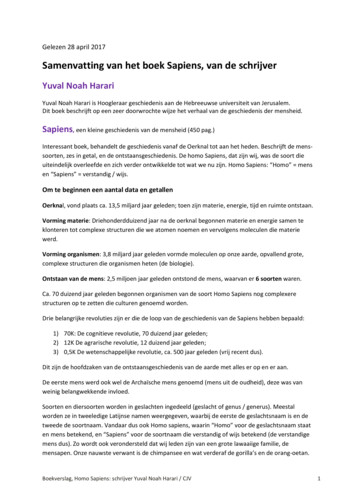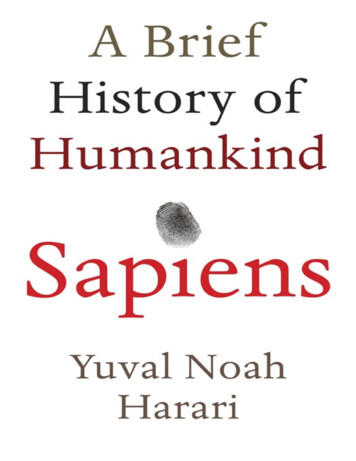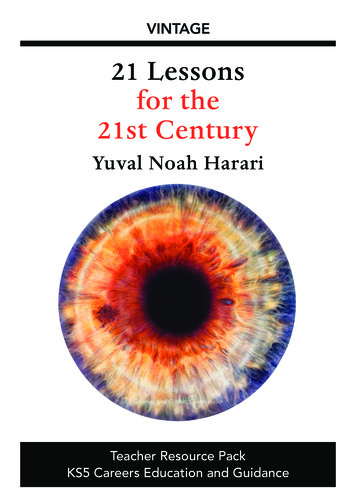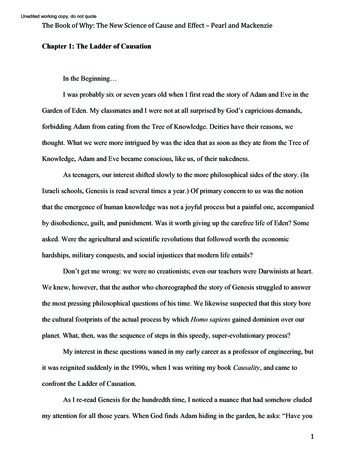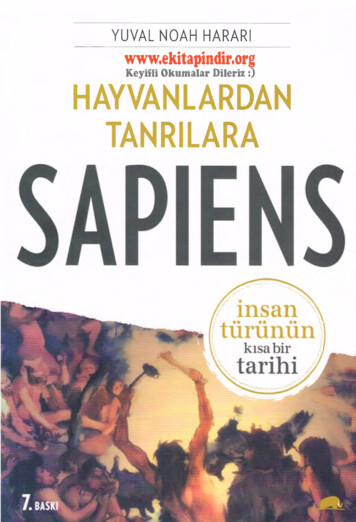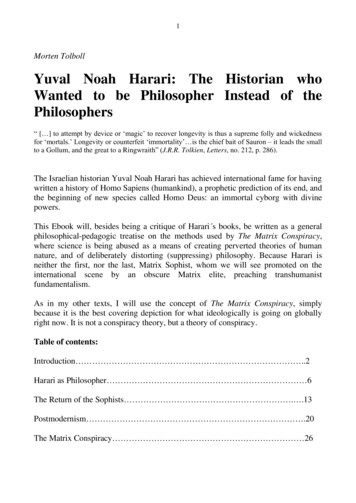
Transcription
1Morten TolbollYuval Noah Harari: The Historian whoWanted to be Philosopher Instead of thePhilosophers“ [ ] to attempt by device or ‘magic’ to recover longevity is thus a supreme folly and wickednessfor ‘mortals.’ Longevity or counterfeit ‘immortality’ is the chief bait of Sauron – it leads the smallto a Gollum, and the great to a Ringwraith” (J.R.R. Tolkien, Letters, no. 212, p. 286).The Israelian historian Yuval Noah Harari has achieved international fame for havingwritten a history of Homo Sapiens (humankind), a prophetic prediction of its end, andthe beginning of new species called Homo Deus: an immortal cyborg with divinepowers.This Ebook will, besides being a critique of Harari s books, be written as a generalphilosophical-pedagogic treatise on the methods used by The Matrix Conspiracy,where science is being abused as a means of creating perverted theories of humannature, and of deliberately distorting (suppressing) philosophy. Because Harari isneither the first, nor the last, Matrix Sophist, whom we will see promoted on theinternational scene by an obscure Matrix elite, preaching transhumanistfundamentalism.As in my other texts, I will use the concept of The Matrix Conspiracy, simplybecause it is the best covering depiction for what ideologically is going on globallyright now. It is not a conspiracy theory, but a theory of conspiracy.Table of contents:Introduction .2Harari as Philosopher 6The Return of the Sophists . .13Postmodernism .20The Matrix Conspiracy 26
2a) René Descartes 27b) George Berkeley .31Scientism .38Evolutionism 42Transhumanism 50The Matrix Hybrid .62Conclusion .70IntroductionYuval Noah Harari has written three books which have raised to international fame.The first book was called, Sapiens: A Brief History of Humankind. The book surveysthe history of humankind from the evolution of archaic human species in the StoneAge up to the twenty-first century, focusing on Homo sapiens. The account is situatedwithin a framework provided by the natural sciences, particularly evolutionarybiology.The next book was called, Homo Deus: A Brief History of Tomorrow. As with itspredecessor, Harari recounts the course of history while describing events and theindividual human experience, along with ethical issues in relation to his historicalsurvey. However, Homo Deus deals more with the abilities acquired by humans(Homo sapiens) throughout their existence, and their evolution as the dominantspecies in the world. The book describes mankind's current abilities andachievements and attempts to paint an image of the future. The premise outlines thatduring the 21st century, humanity is likely to make a significant attempt togain happiness, immortality, and God-like powers. This happens because humanitywill melt together with, or directly transform into cyborgs and artificial intelligence,and the universe into a cyberspace. Therefore Harari can proclaim the end of HomoSapiens and the Universe, and the beginning of Homo Deus and cyberspace.The third book is called, 21 Lessons for the 21st Century. Having dealt with thedistant past in Sapiens and with the distant future in Homo Deus Harari turns in 21Lessons his attention to the present. In a loose collection of essays, many based onarticles previously published, he attempts to untangle the technological, political,social, and existential quandaries that humankind faces.
3On his website, Harari presents himself in third person:In 2018 Yuval Noah Harari gave a keynote speech on the future of humanity on theCongress Hall stage of the World Economic Forum annual meeting in Davos. Threemonths later, he presented the first ever TED talk delivered as a digital avatar. Overthe last couple of years Harari has met with President Emmanuel Macron of France,Chancellor Angela Merkel of Germany, President Mauricio Macri of Argentina,President Frank-Walter Steinmeier of Germany, and Mayor Ying Yong of Shanghai.In 2019 Yuval sat down for public conversations with Chancellor Sebastian Kurz ofAustria (on the future of Europe) and with Facebook CEO Mark Zuckerberg (onsociety and the future of artificial intelligence). Sapiens was recommended by Mark Zuckerberg, Barack Obama and Bill Gates. Prof. Harari lectures around the world on the topics explored in his books andarticles, and has written for publications such as The Guardian, Financial Times,The New York Times, The Atlantic, The Economist and Nature magazine. .Transhumanists are known for their work as prophets. The most famous is RayKurzweil (a computer scientist who wants to be philosopher instead of thephilosophers). He is one of the founders of the so-called Singularity University, andis a director of engineering at Google. With the support of NASA, Google and abroad range of technology forecasters and technocapitalists, the SingularityUniversity opened in June 2009 at the NASA Research Park in Silicon Valley withthe goal of preparing the next generation of leaders to address the challengesof accelerating change. Kurzweil is famous for books like, The Age of SpiritualMachines, which has been translated into 9 languages and was the #1 best-sellingbook on Amazon in science. Kurzweil's 2005 book, The Singularity Is Near wasa New York Times bestseller, and has been the #1 book on Amazon in both scienceand philosophy. I mention Kurzweil from the very start, because it is primarily fromhim Harari is borrowing his “philosophy”. Kurzweil has often been called a prophet.In his article, For Transhumanists, a Dawning Realization, David Klinghoffercompares also Harari with a prophet. Klinghoffer gives a brilliant introduction to thekey concepts of Harari s worldview, which isn t different from extreme forms ofcreationism. The difference is that transhumanism is taken seriously globally, and isinduced into our minds through social medias like Google, Facebook, smartphones,etc., etc. It s manipulating power is simply that religious terms have been replaced byscientific sounding terms. Therefore, the importance of using science as a propagandatool. The fact is that is has nothing to do with science. Klinghoffer writes:
4As traditional faiths see their self-confidence eroded by the claims of materialism andevolutionism, to which the culture assigns such monumental prestige, the rise ofother, totally new faiths would seem to be a certainty. Wesley Smith has identifiedone in the process of arising: Transhumanism.Transhumanist prophets anticipate a coming neo-salvific event known as the“Singularity” — a point in human history when the crescendo of scientific advancesbecome unstoppable, enabling transhumanists to recreate themselves in their ownimage. Want to have the eyesight of a hawk? Edit in a few genes. Want to raise yourIQ? Try a brain implant. Want to look like a walrus? Well, why not? Different strokesfor different folks, don’t you know?Most importantly, in the post-Singularity world, death itself will be defeated.Perhaps, we will repeatedly renew our bodies through cloned organ replacements orhave our heads cryogenically frozen to allow eventual surgical attachment to adifferent body. However, transhumanists’ greatest hope is to eternally save theirminds (again, as opposed to souls) via personal uploading into computer programs.Yes, transhumanists expect to ultimately live without end in cyberspace, crafting theirown virtual realities, or perhaps, merging their consciousnesses with others’ toexperience multi-beinghood.Transhumanists used to repudiate any suggestion that their movement is a form of, orsubstitute for, religion. But in recent years, that denial has worn increasingly thin.For example, Yuval Harari, a historian and transhumanist from Hebrew Universityof Jerusalem, told The Telegraph, “I think it is likely in the next 200 years orso Homo sapiens will upgrade themselves into some idea of a divine being, eitherthrough biological manipulation or genetic engineering by the creation of cyborgs,part organic, part non-organic.”[ ]According to Harari, the human inventions of religion and money enabled us tosubdue the earth. But with traditional religion waning in the West — and who candeny it? — he believes we need new “fictions” to bind us together. That’s wheretranshumanism comes in:“Religion is the most important invention of humans. As long as humans believedthey relied more and more on these gods, they were controllable. With religion, it’seasy to understand. You can’t convince a chimpanzee to give you a banana with the
5promise it will get 20 more bananas in chimpanzee Heaven. It won’t do it. Buthumans will.“But what we see in the last few centuries is humans becoming more powerful, andthey no longer need the crutches of the gods. Now we are saying, ‘We do not needGod, just technology.’”Ha! The old stereotype of the bearded Christian fanatic in robe and sandals carryinga sign stating,“The end is nigh!” has been replaced by transhumanism proselytizers like authorRay Kurzweil (of Google fame) whose bestselling transhumanist manifesto istitled, The Singularity is Near.According to Klinghoffer, Harari, mentioned by Wesley, would make an exemplaryprophet for the new faith. He even has a biblical name: Noah. Ensconced at HebrewUniversity with its panoramic view over the Holy City of the three ancientmonotheist religions, Dr. Harari obtained his PhD from Jesus College, Oxford. Tooperfect, almost. His Wikipedia bio goes on:Harari was born in Kiryat Ata, Israel, in 1976 and grew up in a secular Jewishfamily with Lebanese and Eastern European roots in Haifa, Israel. Harari says Vipassana meditation, which he began whilst in Oxford in 2000, has“transformed my life“. He practises for two hours every day (one hour at the startand end of his work day), every year undertakes a meditation retreat of 30 days orlonger, in silence and with no books or social media, and is an assistant meditationteacher. He dedicated Homo Deus to “my teacher, S. N. Goenka, who lovingly taughtme important things,” and said “I could not have written this book without the focus,peace and insight gained from practising Vipassana for fifteen years.” He alsoregards meditation as a way to research.Harari is a vegan, and says this resulted from his research, including his view thatthe foundation of the dairy industry is breaking the bond between mother and calfcows. As of September 2017, he does not have a smartphone.Harari is probably very aware of himself as a prophet. At least, the chapters in hisbooks often have biblical names. Here is a couple of examples from Sapiens: “TheTree of Knowledge”, “A Day in the Life of Adam and Eve”, “The Flood”. And fromHomo Deus: ”The Modern Covenant”.
6First published in Hebrew in 2011 and then in English in 2014, Sapiens wastranslated into 45 languages (as of June 2017). It also made to The New YorkTimes best-seller list and won the National Library of China's Wenjin BookAward for the best book published in 2014.Writing four years after its English-language publication, Alex Preston wrote in TheGuardian that Sapiens had become a "publishing phenomenon" with "wild success"symptomatic of a broader trend toward "intelligent, challenging nonfiction, oftenbooks that are several years old". Concurrently, The Guardian listed the book asamong the ten "best brainy books of the decade". The Royal Society of Biologists inthe UK shortlisted the book in its 2015 Book Awards.Time magazine listed Homo Deus as one of its top ten non-fiction books of 2017.Wellcome longlisted Homo Deus for their 2017 Book Prize.The business magazine Fast Company called him “Silicon Valley’s favoritehistorian”; Mark Zuckerberg boosted his fame when he included “Sapiens” in theFacebook book club; and blurbs from President Barack Obama and Bill Gates gracedthe book’s cover. Gates also did his bit to promote Harari’s subsequent books:“Homo Deus” appeared on his recommended summer reading list for 2017, and thisyear he wrote a rave review of “Lessons” in The New York Times.Just look at Harari s own media site to see how much influence this guy has.Harari as philosopherHarari is a naturally gifted rhetoric, invariably ready with the telling anecdote ormemorable analogy. As a result, it’s tempting to see him less as a historian than assome kind of all-purpose sage.But Harari is just one of many examples of scientists who are suffering from theillusion of transferable expertise. He has an unfortunate tendency to think that beingbrilliant in history means every other specialty can be treated as a special case ofhistory. One of his other favorite sciences is evolutionary biology. Here it goeswrong, as with all the other disciplines he believes he is an expert on. His workranges across a multitude of disciplines with seemingly effortless scholarship,bringing together an illusionary understanding of history, anthropology, zoology,linguistics, philosophy, theology, economics, psychology, neuroscience and muchelse besides.
7But, when looking at his global fame it must be quite a thinker we are dealing withhere. The Times actually called him “The Great Thinker of Our Time”. The fact isthat his books are a worst case scenario of the future of science and philosophy. Thathe is promoted in the way he is just says that this worst case scenario already hasstarted. In this Ebook I will demonstrate how.In her article, Yuval Noah Harari: The age of the cyborg has begun – and theconsequences cannot be known, Carole Cadwalladr asks Harari:In some ways, I say, it struck me that Sapiens isn’t actually a history book – it’s aphilosophy book that asks the big, philosophical questions and attempts to answerthem through history.“Yes, that’s a very accurate description. I think that I see history as a philosophylaboratory. Philosophers come up with all these very interesting questions about thehuman condition, but the way that most of them – though not all – go aboutanswering them is through thought experiments.No, that is not what most philosophers do. It is the opposite way around. A fewphilosophers answer philosophical questions through thought experiments, especiallytranshumanist philosophers like Ray Kurzweil, David Chalmers and Nick Bostrom.When I read Harari s three books I was really looking forward to hear what hisanswers to the great philosophical questions would be. The same was GavinJacobson. In his article, Yuval Noah Harari’s 21 Lessons for the 21st Century is abanal and risible self-help book, he writes:How should democracies contend with the quantum leaps in biotechnology andartificial intelligence (AI), just as “liberalism is losing credibility”? How should weregulate the ownership of data, which “will eclipse both land and machinery as themost important asset”? How will societies respond to AI, and the conceivableuselessness of workers? What will a progressive politics look like since it’s “muchharder to struggle against irrelevance than against exploitation”? Should we fearanother world war? What can be done about climate change? And what are the bestresponses to terrorism and fake news?It would be easier to take Harari seriously if his “lessons” in any way measured upto these global conundrums. Unfortunately, for those who were expecting more fromsuch a celebrated author, his injunctions simply die on contact with the reality of ourpresent moment.
8Jacobson hereafter gives a precise description of Harari s writing style. He writes:The first problem is one of conception. The book is composed from various op-edcolumns, as well as responses to questions asked by readers, journalists andcolleagues. These may have worked well as individual pieces. But taken together, theresult is a study thick with promise and thin in import. The sort of messages Harariissues – “the only real solution is to globalise politics”; “humans of all creeds woulddo well to take humility more seriously”; “invest time and effort in uncovering ourbiases”; “Leave your illusions behind. They are very heavy”; “When you wake up inthe morning, just focus on reality” – are either too vague or too hollow to provideany meaningful guidance.Harari’s concluding style comes straight from the insipid “on the one hand, on theother” school of second-rate essay writing. In the meagre ten pages he devotes to“War” and the chances of a third global conflict, he ends by saying that, “On the onehand, war is definitely not inevitable On the other hand, it would be naive toassume that war is impossible.” And, in the confused and disjointed chapter on“Humility”: “It goes without saying,” he writes, before going on to say it, “that theJewish people are a unique people with an astonishing history (though this is true ofmost peoples).”“It similarly goes without saying,” he continues, before, again, going on to say it,“that the Jewish tradition is full of deep insights and noble values (though it is alsofull of some questionable ideas and of racist, misogynist and homophobic attitudes).”Like an undergraduate struggling to reach the word count, Harari ends up traffickingin pointless asides and excruciating banalities. The debate about immigration “is farfrom being a clear-cut battle between good and evil” and “should be decidedthrough standard democratic procedure”. (He then lazily suggests that if Europemanages to solve the issue of immigration, then “perhaps its formula can be copiedon a global level”.) “The world,” we are subsequently told, “is becoming ever morecomplex.” “Humans have bodies.” “We just cannot prepare for every eventuality.”Nuclear states and terrorism represent “different problems that demand differentsolutions”. “The world is far more complicated than a chessboard.” “Putin isneither Genghis Khan nor Stalin.” And there are “several key differences between2018 and 1914”.Then there are the risible moral dictums littered throughout the text, cringeworthyplatitudes of fortune-cookie quality. So a “small coin in a big empty jar makes a lotof noise” and “hurting others always hurts me too”. “Suffering is suffering, nomatter who experiences it” and “pain is pain, fear is fear, and love is love”. Notforgetting that “change itself is the only certainty”, “emotions such as greed, envy,
9anger and hatred are very unpleasant” and “everything you will ever experience inlife is within your own body and your own mind”. Reading Harari reminded me ofthe line attributed to Abraham Lincoln: “He can compress the most words into thesmallest idea of any man I have ever met.”The point about lousy prose isn’t just one of style. As Tony Judt argued in the NewYork Review of Books in 2010, rhetorical fluency doesn’t always signify originality ordepth of thought. But hesitant, digressive and mediocre writing does indicate animpoverished argument or analysis. As Judt put it, “When words lose their integrityso do the ideas they express.” This is clear in Harari’s chapter on post-truth, forinstance, in which he circles around the issue, meandering into subjects such as thehistory of Nazi and Soviet propaganda, without really landing on any kind ofsubstantive point that helps us make sense of what’s going on now. His eventuallesson is typically flat: “instead of accepting fake news as the norm, we shouldrecognise it is a far more difficult problem than we tend to assume, and we shouldstrive even harder to distinguish reality from fiction. Don’t expect perfection. One ofthe greatest fictions of all is to deny the complexity of the world.”Fine. But once we have accepted that the world is complex, what then? Harari issilent.The concept of, “it goes without saying” and hereafter going on to say it, is typicalfor Harari s self-contradictory rhetoric. In one YouTube video he, for example, startout by saying, “we can t say anything for sure about the future”, whereafter the wholevideo is about Harari saying a lot about things which for sure will happen in thefuture. It is central for him to begin his lectures by saying that his teaching not ispredictions, but that he is only talking about possibilities he wants us to think about.But you will quickly find out that he is involving a lot of assumptions which he istaking at face value. There are thought distortions such as “begging the question” and“circular argumentation” involved overall in Harari s rhetoric. Let s look at it.Though Jacobson s account is a precise description of an unsatisfying way of writing,it is not completely true that Harari doesn t answer the questions he claims he willanswer, because Harari is in fact, between the lines, smuggling a lot of answers inthrough the backdoor. He is namely a clever Matrix sophist (which I will explainlater). Here are the final words in Homo Deus (page 462):[ ] Yet if we take the really grand view of life, all other problems and developmentsare overshadowed by three interlinked processes:
101. Science is converging on an all-encompassing dogma, which says that organismare algorithms and life is data processing.2. Intelligence is decoupling from consciousness.3. Non-conscious but highly intelligent algorithms may soon know us better than weknow ourselves.These three processes raise three key questions, which I hope will stick in your mindlong after you have finished this book:1. Are organisms really just algorithms, and is life really just data processing?2. What s more valuable – intelligence or consciousness?3. What will happen to society, politics and daily life when non-conscious but highlyintelligent algorithms know us better than we know ourselves?Harari is here setting up some assumptions which not have been validated. Science isfor example not converging in such an all-encompassing dogma. You can say thattranshumanism is, but not science. The whole thing is a so-called Questioning Trap.The first aspect of this is rhetorical questions. Rhetorical questions are questionswhich are asked purely for effect rather than as requests for answers. The questionercan for example assume that there only is one possible answer to the question inwhich case the rhetorical question functions in precisely the same way as Persuaderwords. In this form rhetorical questions are simply substitutes for straightforwardstatements.It is comparatively easy and certainly unhelpful to raise a large number of seeminglydeep questions on almost any topic (this is called Pseudo-profundity, somethingwhich apparently has fooled a whole world to believe that Harari is an incrediblephilosopher); what is difficult and important are finding answers to them. ApparentlyHarari thinks that it is a clever tactic just to raise questions, and hereafter leave it tothe reader to answer them. But, as mentioned, he is in fact giving answers all thetime, but he is not capable of giving answers which are grounded in scientificvalidation or philosophical argumentation. He smuggles his answers (which thereforeare pure postulations) in by the use of thought distortions. A central thoughtdistortion is Research has shown that Within scientism there has gone inflation inthe phrase Research has shown that Scientism is seen in the New Ageenvironment, where they demand that science has to be integrated with so-called“alternative sciences”, and in the intellectual environment in form of reductionisms,which demand that science has to be integrated with, or is the same as, certainatheistic/political/postmodernistic views. I will return to scientism later.Research has shown that. is a phrase, which often is used to convince the listenerabout that the one who talks can reason what he says with concrete empirical proof.
11But this is often just an example of subjective argumentation, a kind of unethicalmanipulation (often based on wishful thinking), because it is extremely vague toclaim that ”research has shown” anything, unless you can reason the assertion withspecific details about the claimed research. Who has carried out this research? Whichmethods were there used? What exactly did they found out? Have their results beenconfirmed by others who work within the area?Harari is using this thought distortion frequently; in fact: his whole work is based onit. I will give concrete examples later. Instead of writing, “it is my opinion that ”, hewrites: “research (or science) has shown that ”.Harari appears as unwilling to settle on a certain point of view, and yet he constantlydoes precisely this, by the use of thought distortions. His work is a peace ofgaslightning. Gaslightning is a form of psychological manipulation in which a personseeks to sow seeds of doubt in a targeted individual or in members of a targetedgroup, making them question their own memory, perception, and sanity. Usingpersistent denial, misdirection, contradiction, and lying, gaslighting involves attemptsto destabilize the victim and delegitimize the victim's belief. Gaslightning is also thetactic used by the thought police in George Orwell s dystopian novel, 1984. Here it iscalled Doublethink (see my article What is Doublethink?). We shall see later that thecomparison with Orwell is quite suitable.There is therefore a certain degree of brainwashing present in Harari s books. This isreinforced by his recommendation of the practice of meditation: do nothing andaccept that there is no alternative to Harari s viewpoints. He is namely not presentingmeditation in the traditional way, where philosophy (critical thinking) is quiteimportant, but in the typical Western “Mcmindfulness” way, where meditation isviewed in a purely “scientific” way, so that all religious and philosophical aspects arecut away. In that way meditation just works as hypnotic reinforcement of theideology which accompanies it (see my article, Mindfulness and the Loss ofPhilosophy). I won t go further into his meditation practice, just let you enjoy thisexample of “Harari sayings”:In the course catalogue of the psychology department at my own university, the firstrequired course in the curriculum is “Introduction to Statistics and Methodology inPsychological research”. Second-year psychology students must take “StatisticalMethods in Psychological Research”. Confucius, Buddha, Jesus and Muhammadwould have been bewildered if you d told them that in order to understand the humanmind and cure its illnesses you must first study statistics (Sapiens, page 288).
12This passage is just one example of what, at first, confused me about Harari. Ithought that the passage was meant ironically. And I needed to read the text beforeand the text after, again and again, to find the ironical clue. But the fact is that Harariisn t ironical at all. He simply believes what he writes: “In order to understand thehuman mind and cure its illnesses you must first study statistics”.Now, let s look at his “begging the question” technique. In his article, Sapiens – acritical review, Marcus Paul writes:[ ] there is a larger philosophical fault-line running through the whole book whichconstantly threatens to break its conclusions in pieces. His whole contention ispredicated on the idea that humankind is merely the product of accidentalevolutionary forces and this means he is blind to seeing any real intentionality inhistory. It has direction certainly, but he believes it is the direction of an iceberg, nota ship.This would be all right if he were straightforward in stating that all his argumentsare predicated on the assumption that, as Bertrand Russell said, ‘Man is but theoutcome of accidental collocations of atoms’ and utterly without significance. Butinstead, he does what a philosopher would call ‘begging the question’. That is, heassumes from the start what his contention requires him to prove – namely thatmankind is on its own and without any sort of divine direction. Harari ought to havestated his assumed position at the start, but signally failed to do so. The result is thatmany of his opening remarks are just unwarranted assumptions based on thatgrandest of all assumptions: that humanity is cut adrift on a lonely planet, itself adriftin a drifting galaxy in a dying universe. Evidence please! – that humanity is ‘nothingbut’ a biological entity and that human consciousness is not a pale (andfundamentally damaged) reflection of the divine mind.Begging the question is about assuming the very point that is at issue. Sometimes thisinvolves incorporating the conclusion of the argument into one of the premises. Forexample, in a law case, if someone is being tried on an accusation of murder, and haspleaded not guilty, it would be begging the question to refer to them as “themurderer” rather than “the accused” until their guilt had been established.Some forms of begging the question occur in the way questions are asked. Complexquestions are often question-begging in this way. For instance, the question “Whendid you start beating your husband?” might be question-begging if the fact that youdid beat your husband had yet to be established.
13Besides the example of begging the question, which Marcus Paul is giving, thenanother example of Harari s begging the question is seen in the above-mentionedquestion: “Are organisms really just algorithms, and is life really just dataprocessing?”On page 371-372, he has namely already supplied the premises for answering thisquestion:The idea that humans will always have a unique ability beyond the reach of nonconscious algorithms is just wishful thinking. The current scientific answer to thispipe dream can be summarized in three simple principles:1. Organisms are algorithms, every animal – including Homo Sapiens – is anassemblage of organic algorithms shaped by natural selection over millions of yearsof evolution.2. Algorithmic calculation are not affected by the materials from which thecalculator is built. Whether an abacus is made of wood, iron
The Israelian historian Yuval Noah Harari has achieved international fame for having written a history of Homo Sapiens (humankind), a prophetic prediction of its end, and the beginning of new species called Homo Deus: an immortal cyborg with divine powers. This Ebook will, besides being a critique of Harari s books, be written as a general
